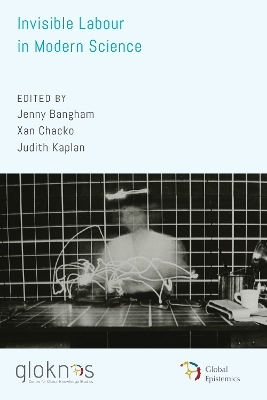
Invisible Labour in Modern Science
Rowman & Littlefield (Verlag)
978-1-5381-5995-8 (ISBN)
Invisibility can be unjust; it can also be powerful. What is invisible to whom, and when does this matter? How do power structures built on hierarchies of race, gender, class, and nation frame what can be seen? And for those observing science: when does the recovery of the ‘invisible’ serve social justice and when does it invade privacy? Tackling head-on the silences and dilemmas that can haunt historians, this book transforms invisibility into a guide for exploring the moral sensibilities and politics of science and its history.
Jenny Bangham is a Wellcome University Award Lecturer in the School of History, Queen Mary University of London, where she researchers the politics, meanings and practices of genetics. She is the author of Blood Relations: Transfusion and the Making of Human Genetics (2020). She is coeditor (with Emma Kowal and Boris Jardine) of the open access volume, ‘How Collections End: Objects and Loss in Laboratories and Museums’ (2019). Xan Chacko is the Mellon Postdoctoral Fellow in Women’s and Gender Studies at Wellesley College. A feminist science studies scholar, her research complicates the taken-for-grantedness of scientific knowledge production to argue for a feminist re-envisioning of science that is committed to justice. Her most recent book is The Last Seed: Colonial Legacies and Botanic Futures. Judith Kaplan is a historian of the human sciences who teaches in the Integrated Studies Program at the University of Pennsylvania (USA). Her work focuses on the rise of modern linguistics in nineteenth-century Germany and on the subsequent development of comparative and historical approaches. She has published widely on topics from orientalism to sound studies and is currently completing a manuscript on Living Language and the Transformation of Linguistics, 1871–1918.
Series Editor’s Note
Acknowledgements
Introduction
I. PEOPLE
Commentary: Sabine Clarke: People and the processes of erasure
1. Julia Rodriguez: Under the Mexican sun: Zelia Nuttall and eclipses in Americanist anthropology
2. Lan A. Li: Escaping immortality: science, civilization, and Lu Gwei-djen
3. María Fernanda Olarte-Sierra: Producing and delivering truth: The (in)visibility of forensic scientists in Colombia
4. Margaret Bruchac: Of animacy and afterlives: Material memories in Indigenous collections
5. Alexandra Noi: The ex-prisoners of Gulag in the Siberian Expeditions
6. Laura Stark: The bureaucratic ethic and the spirit of bio-capitalism
7. Elise Burton: ‘They Say They Are Kurds’: informants and identity work at the Iranian Pasteur Institute
II. POWER
Commentary: Gabriela Soto Laveaga: (Em)powering narratives of technology
8. Mihai Surdu: Categorizing Roma in censuses, surveys and expert estimates
9. Ana Carolina Vimieiro Gomes: Situated knowledge and the genetics of the Brazilian Northeastern population, 1960–1980
10. Sarah Blacker: The invisible labour of translating Indigenous Traditional Knowledge in Canada
11. Omnia El Shakry: Invisible bodies: psychoanalysis, subjugated knowledges, and intimate ethics in postwar Egypt
12. Susannah Chapman: The (in)visible labour of varietal innovation
13. Stuart McCook: Coffee breeders, farmers, and the labours of agricultural modernization
III. PROCESS
Commentary: Susan Lindee: Invisible, secret, and social,
14. Elena Aronova: Citizen seismology, Stalinist science, and Vladimir Mannar’s Cold Wars
15. Jenny Bangham: Blood, paper and invisibility in mid-century transfusion science
16. Xan Chacko: Invisible vitality: the hidden labours of seed banking
17. Judith Kaplan: Oneida inscriptions,
18. Whitney Laemmli: Making movement matter,
19. Caitlin Wylie: Invisibility as a mechanism of social ordering: How scientists and technicians divide power
IV. PRACTICE
Commentary: Judith Kaplan: Teaching practices with invisible labour
20. Joanna Radin: Collecting human subjects: ethics and the archive
21. Lara Keuck: Locating sources, situating psychiatry, complicating categories: a journey through three German archives
22. Boris Jardine: Turing, or: an exhibition should not mean but be
23. Alexandra Widmer: Reproductive labour and indigenous hospitalities in post/colonial fieldwork
24. Rosanna Dent: Invisible infrastructures: A’uwẽ-Xavante strategies to enrol and manage warazú researchers
25. Michaela Spencer: Cultivating a northern Australian public for Yolŋu Cosmologies: ‘Keeping visible’ Yolŋu research practices and their effects
Index
About the Editors and Contributors
| Erscheinungsdatum | 17.08.2022 |
|---|---|
| Co-Autor | Elena Aronova, Jenny Bangham |
| Verlagsort | Lanham, MD |
| Sprache | englisch |
| Maße | 159 x 237 mm |
| Gewicht | 649 g |
| Themenwelt | Geisteswissenschaften ► Philosophie ► Erkenntnistheorie / Wissenschaftstheorie |
| Naturwissenschaften | |
| Sozialwissenschaften ► Politik / Verwaltung ► Politische Theorie | |
| ISBN-10 | 1-5381-5995-3 / 1538159953 |
| ISBN-13 | 978-1-5381-5995-8 / 9781538159958 |
| Zustand | Neuware |
| Haben Sie eine Frage zum Produkt? |
aus dem Bereich


![Was heißt Denken?. Vorlesung Wintersemester 1951/52. [Was bedeutet das alles?] - Martin Heidegger](/media/113619842)